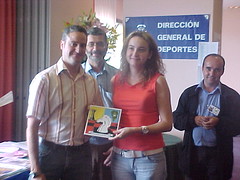A Beauty with Brains
Luis Blasco de la Cruz the Press Manager of the Festival Internacional de Ajedrez Isla de la Palma 2005, being held from the 3rd to 19th June 2005 in the Canary Islands, has been sending me daily updates of this Chess Tournament. I cannot follow the Spanish language in which he writes to me. Today, he sent me this photograph of Antoaneta Stefanova a Bulgarian Chess grandaster. She won the ladies section of the tournament. Antoaneta is 26 years old and has a FIDE rating of 2475. Chessgames.com has her games for our viewing pleasure. A Beauty with Brains!
Technorati Tags: Antoaneta Stefanova, A Beauty with Brains
Blogs linking to this article
Technorati Tags: Antoaneta Stefanova, A Beauty with Brains
Blogs linking to this article



2 Comments:
:)
Chess is originated in India. The Indian origin of the game of chess is supported even by the Encylopedia Britannica according to which, "About 1783-89 Sir. William Jones, in an essay published in the 2nd Vol. of Asiatic Researches, argued that Hindustan was the cradle of chess, the game having been known there from time immemorial by the name Chaturanga, that is, the four angas, or members of an army, which are said in the Amarakosha (an ancient Indian Dictionary - S.B.) to be elephants, horses, chariots and foot soldiers. As applicable to real armies, the term Chaturanga is frequently used by the epic poets of India. Sir William Jones' essay is substantially a translation of the Bhawishya Purana, in which is given a description of a four-handed game of chess played with dice." "Sir William, however, grounds his opinions as to the Hindu origin of chess upon the testimony of the Persians and not upon the above manuscript," He lays it down that chess, under the Sanskrit name Chaturanga was exported from India into Persia in the 6th century of our era; that by a natural corruption, the old Persians changed the name into chatrang; but when their country was soon afterwards taken possession of by the Arabs, who had neither the initial nor the final letter of the The Indian origin of the game of chess is supported even by the Encylopedia Britannica according to which, "About 1783-89 Sir. William Jones, in an essay published in the 2nd Vol. of Asiatic Researches, argued that Hindustan was the cradle of chess, the game having been known there from time immemorial by the name Chaturanga, that is, the four angas, or members of an army, which are said in the Amarakosha (an ancient Indian Dictionary - S.B.) to be elephants, horses, chariots and foot soldiers. As applicable to real armies, the term Chaturanga is frequently used by the epic poets of India. Sir William Jones' essay is substantially a translation of the Bhawishya Purana, in which is given a description of a four-handed game of chess played with dice." "Sir William, however, grounds his opinions as to the Hindu origin of chess upon the testimony of the Persians and not upon the above manuscript," He lays it down that chess, under the Sanskrit name Chaturanga was exported from India into Persia in the 6th century of our era; that by a natural corruption, the old Persians changed the name into chatrang; but when their country was soon afterwards taken possession of by the Arabs, who had neither the initial nor the final letter of the word in their alphabet, they altered it further into Shatranj, which name found its way presently into modern Persian and ultimately into the dialects of India."
word in their alphabet, they altered it further into Shatranj, which name found its way presently into modern Persian and ultimately into the dialects of India." The great Mahabharata War is the result of Chess. There Srimad Bhagavd Gita originated in the battlefied preached by Lord krishna to motivate Arjuna to do his duty as a warrior.
H.J.R. Murry in his monumental work A History of Chess, comes to the conclusion that chess is a descendant of an Indian game played in the 7th century."
It was from India that the ancient Persians are said to have learnt this game, and from them it was transmitted to the Greco Roman world. The evidence of the Persians having borrowed this game from India is seen in the name the Persians gave to it. The Persian word for chess is Chatrang, which was later changed by the Arabs to Shatranj. As said in Encyclopedia Britannica, thig word is obviously a corruption of the Sanskrit original Chaturanga.
Ref.www.orientalia.org/article346.html
Post a Comment
<< Home